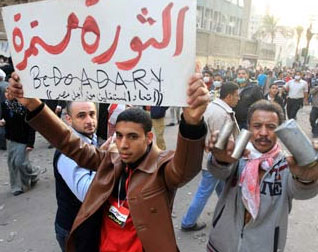Egypt cabinet quits
Egypt's cabinet said on Monday it had resigned as clashes raged in Tahrir Square between police and protesters demanding democratic change in the country's biggest crisis since Hosni Mubarak's ouster.
State television quoted a military source as saying the ruling military council had rejected the resignation, but Information Minister Osama Heikal told the official MENA news agency the matter had not yet been decided.

An Egyptian man holds up a banner that reads in Arabic, "The revolution is still running"
"The government of Prime Minister Essam Sharaf has handed its resignation to the (ruling) Supreme Council of the Armed Forces," cabinet spokesman Mohammed Hegazy said in a statement.
Sharaf's resignation, if accepted, threatens to derail parliamentary elections scheduled for November 28 -- the first polls since Mubarak was toppled in February.
Tens of thousands of people packed Tahrir Square on Monday night, as clashes continued for a third straight day between protesters and police in and around the square.
The United States said it was "deeply concerned" by the violence which has left at least 24 people dead since Saturday.
White House spokesman Jay Carney said it was important that US ally Egypt move toward democratic elections.
"We're deeply concerned about the violence," he said. "We call on restraint of all sides."
US State Department spokeswoman Victoria Nuland echoed the White House call for "free, fair elections," and expressed the hope the electoral process would remain on schedule.
Political forces behind the uprising have called for a mass rally on Tuesday to demand that the army cede power to civilian rule.
The Coalition of Revolution Youth and the April 6 movement, among others, have called for the protest at 4:00 pm (1400 GMT, 10pm Singapore time) in Tahrir Square, the epicentre of rallies that ousted Mubarak in February.
In a Facebook page for the rally, the groups called for the immediate resignation of Sharaf's cabinet and the formation of a "national salvation" government.
They also demanded a presidential election by April 2012 and a complete overhaul of the interior ministry.
Police and military forces on Monday sporadically used batons, tear gas and birdshot against thousands of protesters in Tahrir Square.
Renewed fighting also broke out in the Mediterranean city of Alexandria, state television said.
Hundreds have also been injured during the protests that have raged in Cairo, Alexandria and the canal city of Suez.
Culture minister Emad Abu Ghazi earlier quit in protest at the government response to the demonstrations, he told the official MENA news agency.
The health ministry said 24 people had died in the violence, kicking off a violent countdown to next week's parliamentary elections.
Egypt's stock exchange tumbled 4.04 percent on closing on Monday, with the main EGX-30 index dropping 3,860.00 points.
Arab League chief Nabil al-Arabi called for calm and urged all political forces to press ahead with the democratic process.
He urged them "to work for calm and return to the political process and move forward with the process of democratic change based on the principles of freedom, dignity and social justice on which the January 25 revolution was founded."
In a statement, 140 diplomats from the foreign ministry and Egypt's missions abroad called for "an end to the violence and attacks by security forces against peaceful protesters."
The clashes first erupted on Saturday, a day after large crowds staged a peaceful anti-military mass rally at the square, resuming on Sunday and carrying through the night into Monday.
On Sunday, police and troops seized the square, only to be beaten back by protesters who retook it later -- which also happened on Saturday.
There were heavy clashes on side streets leading to the interior ministry as protesters chanted "The people want to topple the field marshal" -- Hussein Tantawi, Mubarak's long-time defence minister who heads the ruling military.
Egypt's cabinet, which held crisis talks on Sunday for several hours before moving en masse to the headquarters of the ruling Supreme Council of the Armed Forces (SCAF) for another meeting, said in a statement that next week's parliamentary elections would go ahead.
The SCAF, in a statement read out on state television, said it "regretted" what was happening and said it was committed to the elections timetable.
Earlier Mohsen al-Fangari, a member of the council, insisted the election would go ahead as planned and that the authorities were able to guarantee security.
"We will not give in to calls to delay the elections. The armed forces and the interior ministry are able to secure the polling stations," Fangari told a television talk show.
Several prominent political figures and intellectuals, including former UN nuclear watchdog chief Mohamed ElBaradei, earlier issued a call for a delay to the legislative polls.
They submitted a new transition roadmap which would see an elected constituent assembly draft a constitution and then a presidential election would be held, followed by parliamentary polls.
Friday's peaceful rally, which grouped Islamist and secular activists, called on the military to hand power to a civilian government. It also demanded more control over the constitution the new parliament is to draft.
Protesters called for the withdrawal of a government document that proposes supra-constitutional principles, which could see the military maintain some control over the country's affairs and keep its budget from public scrutiny.
- AFP/wk

